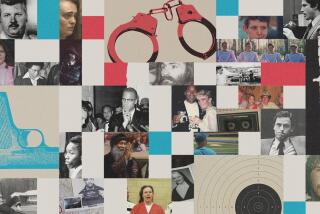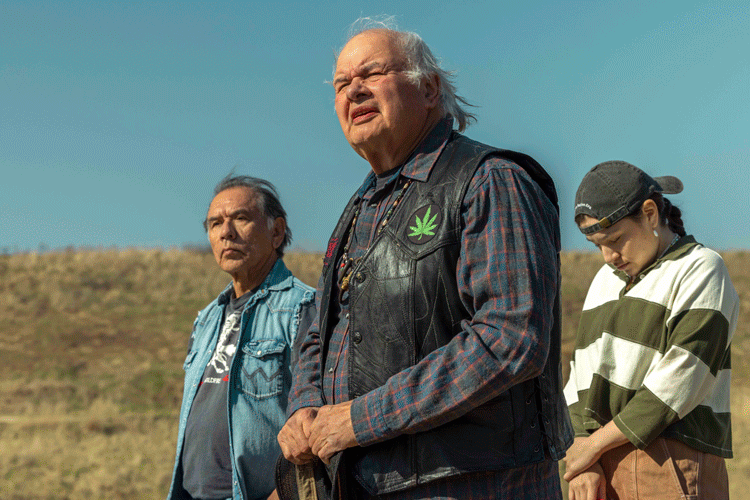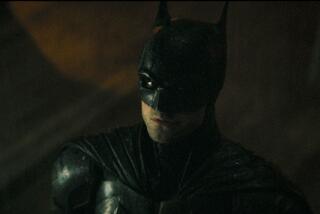TELEVISION REVIEWS : New TV Season: Hard Labor in Hollywood : Now, a Brief Word About TV’s Obsession With Shortcuts
- Share via
TV is making this the age of brevity, the age of sound bites and life bites, the age of condensing, abridging and fast-forwarding.
Shorter is better because it is more marketable, mini-experiences being more salable and enduring commodities in today’s culture than miniskirts. Thanks to TV, we’re all electronic noshers.
We have a news-compressing daily newspaper (USA Today) copied after TV and now a daily TV series (“USA Today: The Television Show,” starting at 7 tonight on KCBS-TV Channel 2) copied after the newspaper that is copied after TV.
Speed is our addiction. All we want is a touch, a taste,
a hint, a feel, a whiff, a sample, a digest, a headline, 2 cents on the dollar--anything that allows us to shortcut the full experience of life . . . and rush on to the next nibble.
Fortunately, not everyone in TV has succumbed to this anorexia of the mind and spirit.
Said that extraordinary TV journalist Bill Moyers last June: “In this video age of rapid cuts and blackout effects, of wipes and constant infusion of new material every 30 seconds lest we lose the attention of the viewer, I cling to faith in the talking head.”
The talking head with something to say and the time to say it.
That is exactly what’s available from the mind-nurturing PBS series “Bill Moyers’ World of Ideas” that premieres at 11 p.m. tonight on Channels 24 and 28, the first of 50 half-hour conversations that will air weeknights over a 10-week period.
Beginning tonight with film maker David Puttnam (a second program with Puttnam airs Friday), these are wonderful half-hours, the first group linked by idealism and advocacy for change.
Puttnam, whose producing credits include “Chariots of Fire,” “The Killing Fields” and “The Mission,” charges that Sylvester Stallone’s batch of “Rambo” films “dangerously reduces the notion of death and dying into an abstraction, and death isn’t an abstraction.”
Abstractions are omitted from “World of Ideas.” The exhilaration you feel from the series comes in knowing that it expands your own world of ideas.
When hearing scientist Jessica Tuchman Mathews discuss with Moyers on Tuesday the awesome peril of global warming and this year’s “anomalous, strange weather,” for example, it strikes you that TV stations, instead of only Fritzing and Dr. Georgeing their way through the forecasts, should also hire science reporters to better explain the crisis we are now apparently facing.
Wednesday’s guest is ethicist Michael Josephson and Thursday’s is historian Henry Steele Commager, preceding the return of Puttnam on Friday.
How ironic that Moyers’ expanding and broadening series should start the same day as two weekday syndicated series that use an electronic shorthand to record or approximate real-life experiences. And ironic that Moyers’ first conversation is with Puttnam, who maintains: “Our political and emotional responses rest, for their health, in the quality and integrity of the present and future generation of television and film creators.”
Rest uneasily, it would seem.
Many of today’s TV creators are busy straddling truth and fantasy by producing syndicated programs that offer, in effect, abbreviated simulations of real experiences.
The movement toward “reality” shows has accelerated in recent years, from an actual psychologist on cable, acting out emotional therapy sessions with actors as patients, to the current slew of such law shows as “Divorce Court,” “People’s Court” and “Superior Court.”
And now come “Family Medical Center,” “Group One Medical” and “On Trial.”
Airing at 11:30 a.m. on KTTV Channel 11, “Family Medical Center” uses hand-held cameras, an improvisational style and actors as doctors and patients to convincingly simulate medical cases like the one on today’s premiere:
Should Rosa Moroni (Maria Rangel) delay leukemia treatment so she will not have to terminate her pregnancy? Her family says no, Rosa says yes.
The result is a surprisingly affecting and convincing half-hour, showing a courageous patient’s dilemma as Dr. Alexander Raines (Wortham Krimmer)--one of three doctors at the Family Medical Center--meets with Rosa and her family, presides over her treatment and occasionally addresses the camera while dispensing medical advice.
“Family Medical Center” is from Ralph Edwards and Stu Billett--who bring you “People’s Court” and “Superior Court”--and is closely supervised by real physicians.
You wonder, though, if, unlike the real medical world, there will be only happy or hopeful endings on “Family Medical Center”--and only positive images of doctors. On the premiere, Raines makes Maria’s first visit “on the house”--what planet does this kind of doctor live on?--and she responds by promising to name her baby after him.
Although highly watchable, moreover, the brevity of the “Family Medical Center” format tends to trivialize Maria’s anguish and painful treatment.
That other daytime medical series, “Group One Medical,” does not premiere on KNBC Channel 4 until Oct. 3. Suffice to say for now that it features real doctors and real patients--and real cameras right in there with them, as they discuss such topics as warts and constipation.
The creator of “Group One Medical” is former CBS News President Van Gordon Sauter, whose news director when he was general manager at KNXT (now KCBS) Channel 2 was Jay Feldman, now executive producer of “Family Medical Center.”
Apparently, there’s more profit and challenge in “reality” shows than in reality.
Meanwhile, there’s “On Trial,” airing at noon on KCOP Channel 13, where former Cincinnati and KNBC Channel 4 anchorman Nick Clooney hosts and narrates footage of actual trials that have been drastically edited and boiled down to accommodate the half-hour format.
Selecting only sensational cases, the “On Trial News Service” mostly shoots its own trial footage (44 states now allow cameras in the courtroom). Then . . . a little opening argument . . . a little testimony . . . a little closing argument and-- voila !--a verdict.
Exactly like real 22-minute trials.
An 18-year-old youth testifies against his 16-year-old brother in the opening murder trial concerning the apparently racially motivated slaying of a black transient in Tampa, Fla.
Despite “A Current Affair”-style background music and the case’s provocative nature, today’s premiere is not only tedious but inevitably dishonest, creating the false impression that courtroom proceedings can be capsulized without distortion and that “On Trial” is helping the public exercise its “right to know.”
What about its right to not be misled?
More to Read
The complete guide to home viewing
Get Screen Gab for everything about the TV shows and streaming movies everyone’s talking about.
You may occasionally receive promotional content from the Los Angeles Times.






